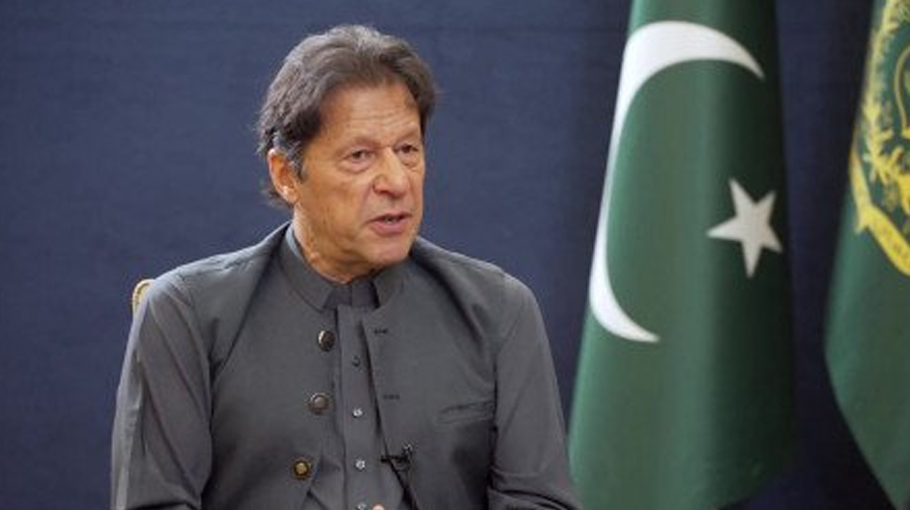Pakistan sinks into constitutional crisis

The solution to the constitutional crisis in Pakistan and the fate of its embattled Prime Minister Imran Khan now depend on the decision of the Supreme Court, which is the custodian of the constitution.
The South Asian country got into the crisis after Imran Khan ducked an Opposition-moved no-confidence motion with the intervention of Deputy Speaker Qasim Suri and President Arif Alvi, both from his Pakistan Tehreek-e-Insaf (PTI).
The deputy speaker rubbished the no-confidence vote exercising, what he said, the provision of the constitution. Meanwhile, the presidentdissolved the parliament in an apparent move to ensure that the prime minister does not face the vote in parliament.
The interventions of the deputy speaker and president have promoted the Opposition to move the Supreme Court, which is scheduled to give a decision on Tuesday.
Leading jurists of Bangladesh say though the president is more powerful than the chief justice as per the constitution of Pakistan, everything now depends on the decision of the apex court.
Talking to Bangladesh Post on Monday, senior advocate Sayed Ahmed Raza said, if you look at the constitutions of Bangladesh, India and Pakistan, you will see that as per the constitutions, the president is more powerful than the chief justice.
Constitutions of these countries have empowered the president with five important powers. These include appointing the prime minister, speaker, army chief, chief justice and attorney general.
Responding to another question, the renowned lawyer said, Pakistan is facing a serious constitutional crisis triggered after the Pakistani National Assembly deputy speaker prevented the much-talked-about no-confidence resolution against Prime Minister Imran Khan terming it unconstitutional.
During any constitutional crisis, the Supreme Court as a guardian of the constitution, interprets the constitution. So the decision of the Pakistan Supreme Court will be final, he opined.
The young and talented Bangladeshi lawyer said, the future of Pakistan, especially the solution of the current constitutional crisis, mainly depends on the Chief Justice of Pakistan.
Meanwhile, Pakistan Prime Minister Imran Khan has proposed former chief justice Gulzar Ahmed as caretaker Prime Minister.
He took the decision following an approval from the core committee of Pakistan Tehreek-e-Insaf (PTI).
Earlier in the day, Pakistani PresidentArifAlvi said Khan would continue as the Prime Minister of Pakistan until the appointment of a caretaker premier.
He had written to both Khan and leader of the Opposition in the outgoing National Assembly Shehbaz Sharif urging them to propose names of suitable persons for appointment as the caretaker premier.
Prime Minister Imran Khan questioned the Opposition, asking why they approached the Supreme Court (SC) after fresh elections were announced.
His remarks came while holding a live Q&A session on Monday, during which he criticised the Opposition for running away from the elections, saying that the Opposition is scared of PTI's popularity.
“When elections were announced, what was the Opposition doing in the Supreme Court? The Opposition wants an NRO II,” he said in his opening remarks.
Chairman Bilawal Bhutto-Zardari Monday urged Director-General Inter-Services Public Relations (ISPR) Major General Babar Iftikhar to clarify the proceedings of the 37th National Security Council (NSC) meeting held last week.
Taking to his Twitter handle, Bilawal said that Prime Minister Imran Khan is using a “foreign conspiracy” to justify his “coup”.
Shortly after the no-trust motion against Prime Minister Imran Khan had been dismissed by the National Assembly's deputy speaker and the NA was dissolved by the president on Sunday, Director General of the Inter-Services Public Relations (ISPR) Maj Gen Babar Iftikhar said the army is not involved in politics.
"Army has nothing to do with the political process," he told Reuters in response to a question about the institution's involvement in the events.
Amid controversy surrounding the much-talked-about “threat letter”, senior journalist and analyst Hamid Mir revealed that the letter flashed by the premier on March 27 at a PTI rally is not the one he received from a Pakistani diplomat.




